Implementation of the Sufficiency Economy Philosophy to the Pracharath Project Chiang Mai Implementation of the Sufficiency Economy Philosophy to the Pracharath Project Chiang Mai
Main Article Content
Abstract
The research purposes were 1) to study the context of the Pracharath project in Chiang Mai, 2) to study the philosophy of sufficiency economy concept to strengthen basic economics of the Pracharath Project and 3) to propose ways to implement the philosophy of sufficiency economy project to strengthen basic economics of Pracharath project guidelines. The study was a mixed method research. The sample group included 250 projects. The data were analyzed using rating scale, descriptive statistics, percentage, mean, and standard deviation. In-depth interview was also included for 3 successful projects. This research found that 1. Conducting business by applying the Sufficiency Economy Philosophy to strengthen the community economy at a moderate level ( =3.28). 2. The strength of the basic economy according to the Pracharat Project approach was at a high level (
= 3.51). 3. Applying the Sufficiency Economy Philosophy in each issue, namely
moderation, rationality, and immunity make the community economy strong the community earns more. and the community is happy at a high level in all The research was also found that the achievement of the project was related to the social capital of the community including 1) community culture 2) humans 3) several organizations as well as different groups in the communities. 4) community networks and 5) local wisdom. These would increase community income, strengthen community economy, and build up the happiness to develop the quality of life of the people in the communities. These would also reduce both social and economic inequalities.
Article Details

This work is licensed under a Creative Commons Attribution-NonCommercial-NoDerivatives 4.0 International License.
References
สถาบันพัฒนาองค์กรชุมชน กระทรวงพัฒนาสังคมและความมั่นคงของมนุษย์. (2559). คู่มือการส่งเสริมการพัฒนาระบบเศรษฐกิจฐานราก. กรุงเทพฯ: สำนักสนับสนุนขบวนการองค์กรชุมชนและสำนักสื่อสารการพัฒนา.
สภานโยบายวิจัยและนวัตกรรมแห่งชาติ. (2560). ยุทธศาสตร์ชาติ พ.ศ. 2560-2580. กรุงเทพฯ: สำนักงานคณะกรรมการนโยบายวิทยาศาสตร์เทคโนโลยีและนวัตกรรมแห่งชาติ.
สำนักงานกองทุนหมู่บ้านและชุมชนเมืองแห่งชาติ สาขา 1. (2560). รายงานประจำปี กองทุนหมู่บ้านและชุมชนเมืองแห่งชาติสาขา 1 พ.ศ. 2561. เชียงใหม่: สำนักงานกองทุนหมู่บ้านและชุมชนเมืองแห่งชาติ สาขา 1.
สำนักงานกองทุนหมู่บ้านและชุมชนเมืองแห่งชาติ สาขา 1. (2561). เป้าหมายการดำเนินงานกองทุนหมู่บ้าน. สืบค้นเมื่อ 5 พฤษภาคม 2565, จาก http://www.villagefund1. or.th/missionfund
สำนักงานกองทุนหมู่บ้านและชุมชนเมืองแห่งชาติ สาขา 1. (2561). ศูนย์ข้อมูลกองทุนหมู่บ้าน. สืบค้นเมื่อ 1 พฤษภาคม 2565, จาก http://www.villagefund1.or.th/informationcenter
สำนักงานกองทุนหมู่บ้านและชุมชนเมืองแห่งชาติ. (2559). คู่มือการดำเนินงานโครงการเพิ่มความเข้มแข็งของเศษฐกิจฐานรากตามแนวทางประชารัฐ. นนทบุรี: สำนักงานกองทุนหมู่บ้านและและชุมชนเมืองแห่งชาติ.
สำนักงานกองทุนหมู่บ้านและชุมชนเมืองแห่งชาติ. (2560). คู่มือการดำเนินงานเพิ่มความเข้มแข็งของเศษฐกิจฐานรากตามแนวทางประชารัฐ สำหรับกองทุนหมู่บ้านและชุมชนเมือง. นนทบุรี: สำนักงานกองทุนหมู่บ้านและและชุมชนเมืองแห่งชาติ.
สำนักงานการพัฒนาเศรษฐกิจฐานรากและประชารัฐ. (2559). สานพลังประชารัฐ คณะทำงานการพัฒนาเศรษฐกิจฐานรากและประชารัฐ พ.ศ. 2559. กรุงเทพฯ: บริษัท อัมรินทร์พริ้นติ้งแอนด์พับลิซซิ่ง จำกัด (มหาชน).
Kispredarborisuthi, B. (1997). Social sciences research methodology. Bangkok: Jaroenpol Press.
Patitangkho, S. (2015, January- June). A Study of Integrative Models for Solving the Poverty Problem in Community Using the Sufficiency Economy Philosophy : A Case Study of Tradtoun Village, Chumhed Sub-district, Muang District, Buriram Province. Research and Development Journal, 10(1), 20-30.
Ploywan P. (2010). The process of driving the Sufficiency Economy Philosophy in the private sector. Bangkok: Chulalongkorn University Press.
Sombhat, U. (2006). Community organization management. Bangkok: The Thailand Research Fund.
Supunya, P. (2007). The application of sufficient economic philosophy into real practice of village leaders who project of sufficient economic villages, Khon Kaen. Master of Education Thesis in Social Studies, Graduate School, Khon Kaen University.
Sutham, P. (2003). Community dynamics and self-sufficiency in the West. Bangkok: Vithithat Institute.
Wutthiviy, W. (2008). The factors affecting on the application of sufficiency economy philosophy into real practice in Thasobchai Municipal, Maetha District, Lamphun Province. Master of Public Administration in Local Government, College of Local
Administration, Khon Kaen University.

